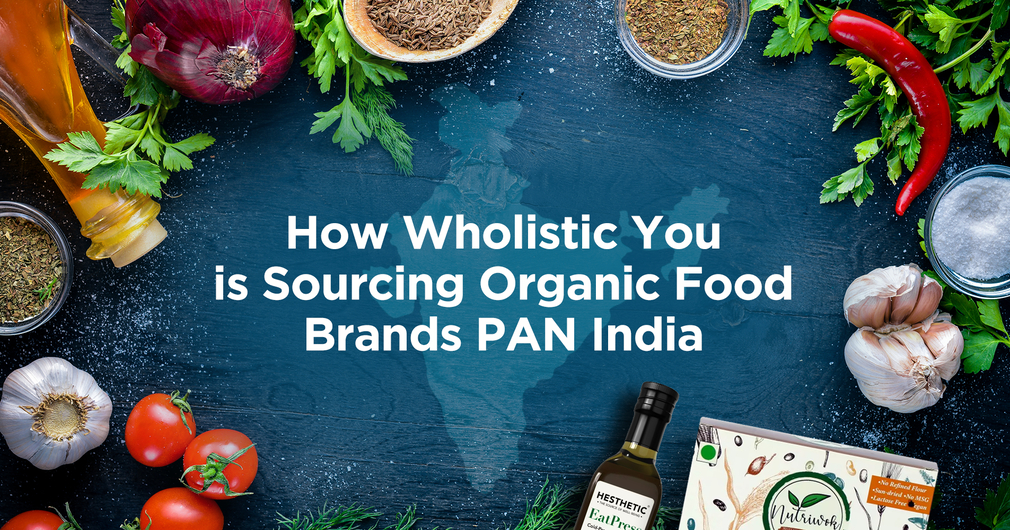
How Wholistic You is Sourcing Organic Food Brands PAN India

How Wholistic You is Sourcing Organic Food Brands PAN India
Wholistic You is an online store where the team sources and curates specifically chosen vegan-only and organic products which are locally sourced. We strive to fulfill our mission of bringing together all of India’s organic food and vegan-only brands under one full scale platform based out of Kolkata, the City of Joy.
The company is one of the largest organic food store in India, offering 100% organic, artificial substance free, sustainable and plant-based products.
Here you are presented with a plethora of organic products ranging from food, skincare products, sustainable clothing, aesthetic home accessories, makeup and exclusively customisable organic gift hamper baskets compiled for every occasion. This is the right place for anyone looking for locally sourced organic products from handpicked Indian brands who aim at bringing only the best of the best to your tables.
- Look for Logos
- Jaivik Bharat
- India Organic Logo (NPOP certified)
- In the scenario of a single ingredient product where all the requisite parameters have been met as per the specified government standards, can be marked as ‘Organic’.
- If it’s a multiple ingredient product where 95% of ingredients are certified as authentic, it can be marked as ‘Certified Organic’.
- Participatory Guarantee System (PGS)
- Cross check with Online Database
- Testing Centers
- Direct Interaction with Farmers
- Checking Suppliers Organic Certification
- Ask for copies of their original certification documents.
- Cross check if the documents are up-to-date.
- Check whether the documents contain the name of the exact company from whom the purchase is being done (i.e. the supplier has not provided any other certificates belonging to someone else further down the chain of supply).
- Make sure to verify the supplier’s current organic status to ensure that one stays updated with current documents when the previous ones become outdated and are renewed.
- Develop this practice of checking into your business procedures to ensure timely checks are done.
As is known to everyone, there are red or green dots on almost every packaging of food products to identify which of them are vegetarian or non-vegetarian. Similarly, the Food Safety and Standards Authority of India (FSSAI) has formulated and introduced a variety of logos to determine the authenticity of organic products.
One can check for the Food Safety and Standard Authority of India’s unified logo for organic food products along with the FSSAI license number.
National Program for Organic Production (NPOP) System states that:
Under this Participatory Guarantee System (PGS), though the criterias that need to be fulfilled are the same as the NPOP system, both of these programmes (NPOP and PGS-India) are not interrelated. Products certified and marked under one system cannot be labeled under the other system. NPOP certified products are authorised for both exports and imports, while PGS-India certified products have the authorisation for being traded only in the domestic market.
The FSSAI, in association with APEDA and PGS-India, has structured a dedicated web-portal to amalgamate all the relatable information to form an “Indian Organic Integrity Data Base”, that will help consumers to verify the authenticity of certain organic food items. With the help of this portal, consumers can easily access information about any particular producer, the certification procedure along with the availability of those organic products.
Though it is a humongous task to truly check the authenticity of any organic food products from the base or consumer level, it can be checked at testing centers or specific laboratories. One can send a sample of a product that has to be tested at the concerned laboratories. One thing that might have to be factored in is the huge expenses that can be incurred for testing even a single sample of any product that one might be skeptical about.
Currently, many of the farmers have started to produce organic fruits, vegetables, cereals and pulses in their farming fields. If you can build a direct supply chain from those farmers, then there are minimal changes of adulteration in the process. Such types of organic production, i.e. directly by the farmers, can cost less compared to a completely established and certified organic grower. Furthermore, there are several Farmer Producer Organisations, where farmers can sell their organic products straight to some of their regular customers at certain points and locations.
This is applicable to farms acquiring organic seed, fodder and compound feed. The company from whom one is buying must possess an organic certification.
Steps one can take to verify that a supplier is certified or authorised properly:
It is quite a lengthy and tedious task of following up and keeping track of all the proper and requisite certifications that needs to be tracked on a timely basis. Wholistic You has a wide range of organic brands in association with them, sourcing only the best of the country’s organic produce directly to your doorstep. Being the largest organic food store in India is not just a mere title but comes with endless responsibilities to ensure safe and wholesome health to everyone.



 Free Shipping on Order above ₹499/-
Free Shipping on Order above ₹499/- 